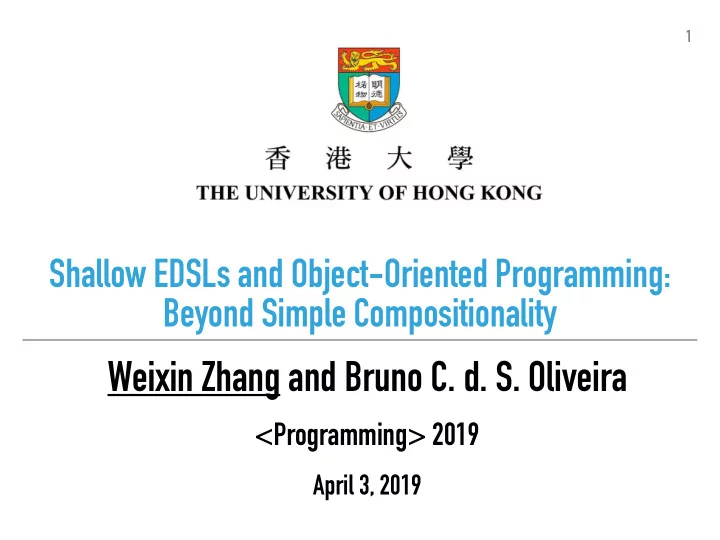

� 1 Shallow EDSLs and Object-Oriented Programming: Beyond Simple Compositionality Weixin Zhang and Bruno C. d. S. Oliveira <Programming> 2019 April 3, 2019
Shallow EDSLs and Object-Oriented Programming: Beyond Simple Compositionality � 2 Background programming languages general-purpose domain-specific standalone embedded (external) (internal) deep shallow
Shallow EDSLs and Object-Oriented Programming: Beyond Simple Compositionality � 3 Shallow vs. deep embeddings ▸ Shallow embeddings ▸ Deep embeddings ▸ Semantics first ▸ Syntax first ▸ Compositional ▸ Non-compositional ▸ No AST ▸ Have an AST ▸ Easy to add new language ▸ Easy to add new interpretations constructs ▸ Hard to add new language ▸ Hard to add new interpretations constructs
Shallow EDSLs and Object-Oriented Programming: Beyond Simple Compositionality � 4 Contribution ▸ Shallow embeddings and OOP are closely related ▸ Both essence is procedural abstraction [Reynolds,1978] Gibbons & Wu, 2015 Cook, 2009 shallow embeddings procedural abstraction OOP ▸ OOP mechanisms, subtyping , inheritance and type- refinement increase the modularity of shallow EDSLs ▸ Enable multiple (possibly dependent) interpretations
Shallow EDSLs and Object-Oriented Programming: Beyond Simple Compositionality � 5 S CANS : a DSL for parallel prefix circuits ▸ Grammar: id 3 above fan 3 fan 3 id 3 id 3 beside fan 3 (fan 2 beside fan 2) stretch 3 2 3 fan 3 above (stretch 2 2 fan 2) above (id 1 beside fan 2 beside id 1)
Shallow EDSLs and Object-Oriented Programming: Beyond Simple Compositionality � 6 Embedding S CANS in Haskell ▸ A shallow implementation should conform to the following signatures semantic domain procedural abstraction ▸ E.g. an interpretation calculating the width
Shallow EDSLs and Object-Oriented Programming: Beyond Simple Compositionality � 7 Towards OOP ▸ An isomorphic encoding of width
Shallow EDSLs and Object-Oriented Programming: Beyond Simple Compositionality � 8 Embedding S CANS in OOP ▸ It is easy to port the definition into an OOP language like Scala
Shallow EDSLs and Object-Oriented Programming: Beyond Simple Compositionality � 9 Smart constructors ▸ Smart constructors are needed for building a circuit object conveniently ▸ Constructing the example circuit again
Shallow EDSLs and Object-Oriented Programming: Beyond Simple Compositionality � 10 Multiple interpretations in Haskell ▸ Often claimed as a limitation of shallow embedding ▸ Typical workaround is to use tuples ▸ e.g. additionally supporting depth for S CANS ▸ However, this implementation is non-modular
Shallow EDSLs and Object-Oriented Programming: Beyond Simple Compositionality � 11 Multiple interpretations in Scala ▸ Multiple interpretations can be modular with Scala Subtyping Type-refinement Inheritance
Shallow EDSLs and Object-Oriented Programming: Beyond Simple Compositionality � 12 Dependent interpretations in Haskell ▸ An interpretation depends not only on itself but also on other interpretations ▸ E.g. wellSized , which depends on width
Shallow EDSLs and Object-Oriented Programming: Beyond Simple Compositionality � 13 Dependent interpretations in Scala ▸ Again, modular dependent interpretations are unproblematic in Scala
Shallow EDSLs and Object-Oriented Programming: Beyond Simple Compositionality � 14 Context-sensitive interpretations in Haskell ▸ An interpretation relies on some context ▸ e.g. layout accumulating parameter
Shallow EDSLs and Object-Oriented Programming: Beyond Simple Compositionality � 15 Context-sensitive interpretations in Scala
Shallow EDSLs and Object-Oriented Programming: Beyond Simple Compositionality � 16 An alternative encoding of modular interpretations ▸ Allow non-linear extensions and loose dependencies ▸ e.g. wellSized ▸ Require an extra step for combining wellSized and width
Shallow EDSLs and Object-Oriented Programming: Beyond Simple Compositionality � 17 Adding language constructs ▸ Extend S CANS with right stretches
Shallow EDSLs and Object-Oriented Programming: Beyond Simple Compositionality � 18 Modular terms ▸ Object Algebras [Oliveira & Cook, 2012] come to the rescue
Shallow EDSLs and Object-Oriented Programming: Beyond Simple Compositionality � 19 Modular terms, extended
Shallow EDSLs and Object-Oriented Programming: Beyond Simple Compositionality � 20 Case study ▸ We refactored an external SQL query processor [Rompf & Amin, 2015] to make it more modular , shallow , and embedded talks.csv
Shallow EDSLs and Object-Oriented Programming: Beyond Simple Compositionality � 21 A relational algebra interpreter ▸ Under the surface syntax, a relational algebra expression is constructed ▸ Each relational algebra operator implements the following interface Project Join Scan Print Filter
Shallow EDSLs and Object-Oriented Programming: Beyond Simple Compositionality � 22 From interpreter to compiler ▸ The interpreter is simple but slow ▸ Turning a slow interpreter into a fast compiler while keeping the simplicity — staging (LMS [Rompf & Odersky, 2010] ) ▸ Actions on records are delayed to the generated code ▸ Two backends are supported (Scala and C), modularly
Shallow EDSLs and Object-Oriented Programming: Beyond Simple Compositionality � 23 Syntax extensions ▸ Add aggregations ( group by ) and hash joins
Shallow EDSLs and Object-Oriented Programming: Beyond Simple Compositionality � 24 Evaluation ▸ The same code is generated, thus performance is similar ▸ The modularity comes with a few more lines of code
Shallow EDSLs and Object-Oriented Programming: Beyond Simple Compositionality � 25 More in the paper ▸ An OOP inspired Haskell encoding of modular (dependent) interpretations
Shallow EDSLs and Object-Oriented Programming: Beyond Simple Compositionality � 26 Conclusion Thank you ! ▸ OOP and shallow embeddings are closely related ▸ The essence of both is procedural abstraction ▸ OOP abstractions bring extra modularity to shallow embeddings ▸ Subtyping, inheritance and type-refinement ▸ Combine extensible interpreters with Object Algebras for greater good ▸ Modular multiple (possibly dependent) interpretations and terms ▸ Shallow embeddings can be performant with staging ▸ The motivation to employ deep embeddings becomes weaker ▸ Mostly reduced to the need for AST transformations https :// github . com / wxzh / shallow - dsl
Recommend
More recommend